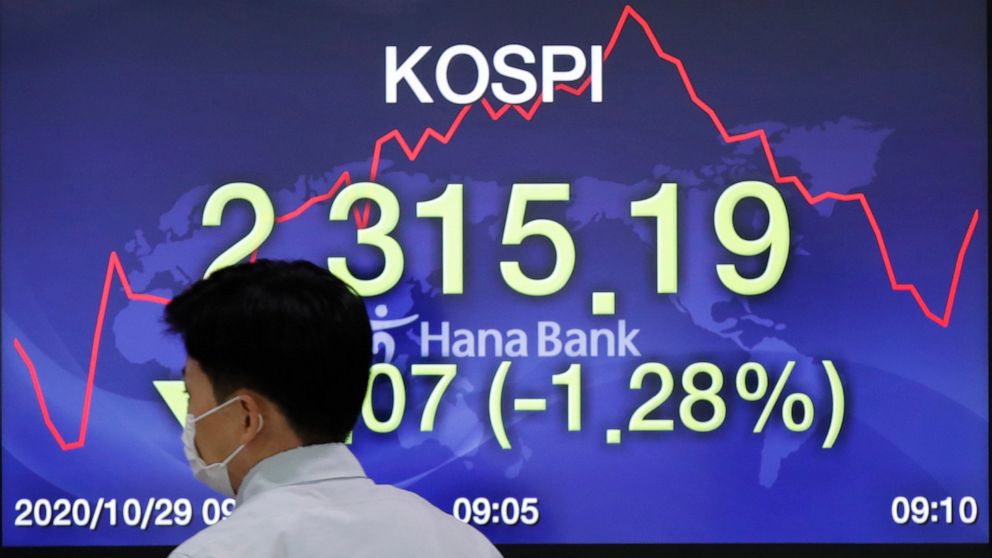Wall Street steadies itself following encouraging reports
U.S. stocks are drifting on Thursday after better-than-expected reports on the economy help stabilize Wall Street following its worst rout in months
NEW YORK — U.S. stocks are drifting upward on Thursday as a couple reports on the economy that were better than expected help to stabilize Wall Street following its worst rout in four months.
The S&P 500 was 0.6% higher following encouraging data on the pace of layoffs and on how powerfully the economy rebounded during the summer from its coronavirus-induced coma. Economists warn big challenges still lie ahead, though, and the S&P 500 is coming off a 3.5% tumble Wednesday on worries the worsening pandemic will drag down the economy and corporate profits again.
The Dow Jones Industrial Average was up 46 points, or 0.2%, at 26,565, as of 9:57 a.m. Eastern time, and the Nasdaq composite was 1% higher. The S&P 500 was a mixed bag, nearly evenly split between stocks rising and falling. Gains for tech stocks were helping to make up for losses for health care and energy stocks.
Despite the relatively calm moves, caution continues to dominate the market. Treasury yields were dipping again, while a measure of investors’ fear in the U.S. stock market touched its highest level since June. Oil prices continued their sharp descent, with benchmark U.S. crude down 5.1% and Brent crude down 5.5%.
Across the Atlantic, European stocks were down, but the losses were milder than their plunge from a day before. That’s when France and Germany announced new restrictions on businesses in hopes of slowing the accelerating spread of the virus.
Coronavirus cases are also on the rise in the United States, raising worries about similar restrictions returning. Even if the sweeping lockdowns that suffocated the economy earlier this year don’t come back, the fear is that the worsening pandemic could nevertheless keep customers away from businesses regardless and undercut their profits.
The economy had been making strides in the summer, and it grew at a record annual rate of 33.1% from July through September, according to a government estimate released Thursday. That followed up on its crash from April through June, when it shrank at an annualized rate of 31.4%.
More recently, the number of U.S. workers applying for unemployment benefits eased last week to 751,000. While that’s still incredibly high compared with before COVID-19, it’s not as bad as the 791,000 from the prior week. It was also better than economists had forecast.
But the budding recovery is under threat now with coronavirus cases surging and with Congress and the White House unable to deliver additional support for the economy. Economists and investors have been asking for such assistance since the summer, when the last round of supplemental benefits for laid-off workers and other stimulus approved by Congress earlier this year expired.
Several of the biggest U.S. companies are scheduled to report how much profit they made during the summer after trading closes on Thursday. Because of their massive market value, the movements of stocks for Apple, Google’s parent company and Amazon have a much greater impact on the S&P 500 and other indexes than other stocks.
Expectations are high for Big Tech companies, which have been largely cruising through the pandemic. Investors have bid up their stock prices on the belief that their profits will continue to soar as work-from-home and other trends accelerated by the pandemic hold.
But another tech giant, Microsoft, saw the potential downside of such huge expectations on Wednesday. That’s when its stock slumped 5% even though it reported stronger profit and revenue for the latest quarter than Wall Street expected.
Across Wall Street, analysts have noted that stocks have not been getting as big a boost as they usually do after reporting stronger profits than forecast.
In European stock markets, France’s CAC 40 fell 1.2%, and Germany’s DAX lost 0.8%. The FTSE 100 in London slipped 0.7%.
In Asia, Japan’s Nikkei 225 dipped 0.4% after its central bank held steady on its monetary policy while downgrading its outlook due to COVID-19 outbreaks.
“Our nation’s economy is still in a severe situation from the effects of the coronavirus both inside and outside of Japan. But since business activity has restarted, we can say that the economy has been recovering,” BOJ Gov. Haruhiko Kuroda told reporters.
South Korea’s Kospi fell 0.8%, Hong Kong’s Hang Seng lost 0.5% and stocks in Shanghai inched up by 0.1%.
The yield on the 10-year Treasury dipped to 0.78% from 0.79% late Wednesday.
———
AP Business Writer Elaine Kurtenbach contributed.
![]()


